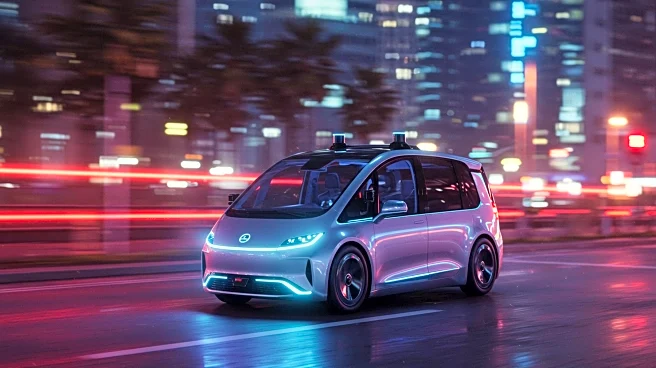What's Happening?
Tesla has initiated its robotaxi service in Austin, marking a significant shift from traditional vehicle sales to a model focused on recurring revenue from autonomous transportation. The company aims to capture a substantial portion of the projected $10 trillion global robotaxi market by 2029. Tesla's approach contrasts with competitors like Waymo, which has been gradually expanding its autonomous ride services. Tesla's strategy involves rapid scaling using its vertically integrated manufacturing and extensive data collection capabilities, which are expected to provide competitive advantages in cost and efficiency.
Why It's Important?
The launch of Tesla's robotaxi service represents a pivotal moment in the transportation industry, potentially transforming urban mobility and reducing reliance on personal vehicle ownership. This shift could significantly impact the ride-hailing market, currently dominated by companies like Uber and Lyft. Tesla's ability to scale quickly and efficiently may allow it to undercut competitors' prices, offering more affordable autonomous transportation options. The success of Tesla's robotaxi service could accelerate the adoption of autonomous vehicles, influencing regulatory frameworks and urban planning strategies across the U.S.
What's Next?
Tesla plans to expand its robotaxi service to other major U.S. cities, leveraging its manufacturing capabilities and data-driven approach to enhance service coverage and efficiency. The company may face regulatory challenges, particularly in states with stringent autonomous vehicle laws. However, a shift towards federal regulation could facilitate broader deployment. As Tesla and Waymo continue to compete, the landscape of urban transportation is likely to evolve, with potential implications for public transit systems and infrastructure development.
Beyond the Headlines
The rise of robotaxis could lead to significant changes in urban design, with reduced need for parking spaces and increased demand for efficient traffic management systems. Ethical considerations regarding data privacy and safety standards for autonomous vehicles will become increasingly important as these services expand. The environmental impact of widespread autonomous vehicle adoption, including potential reductions in emissions and traffic congestion, will also be a critical area of focus.










